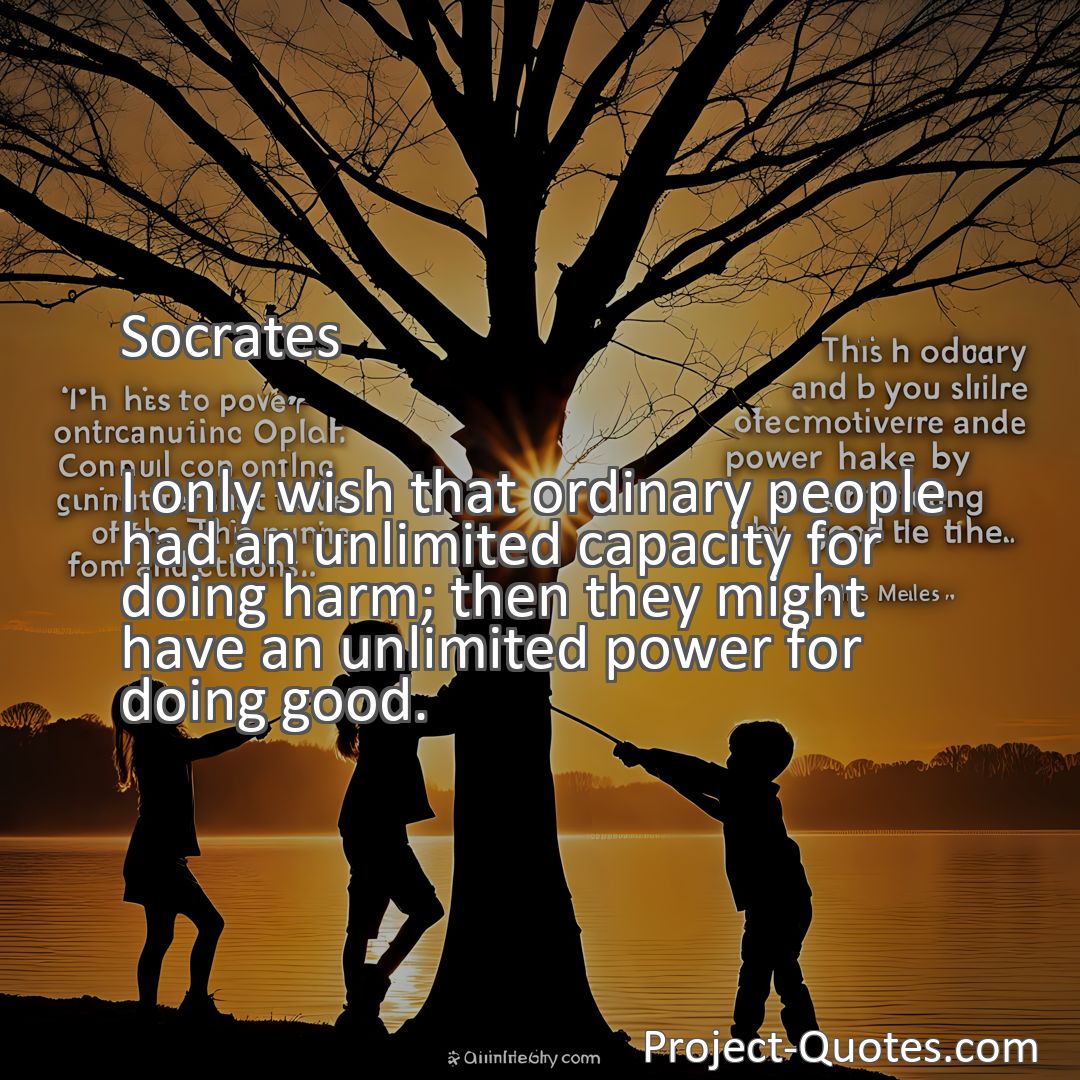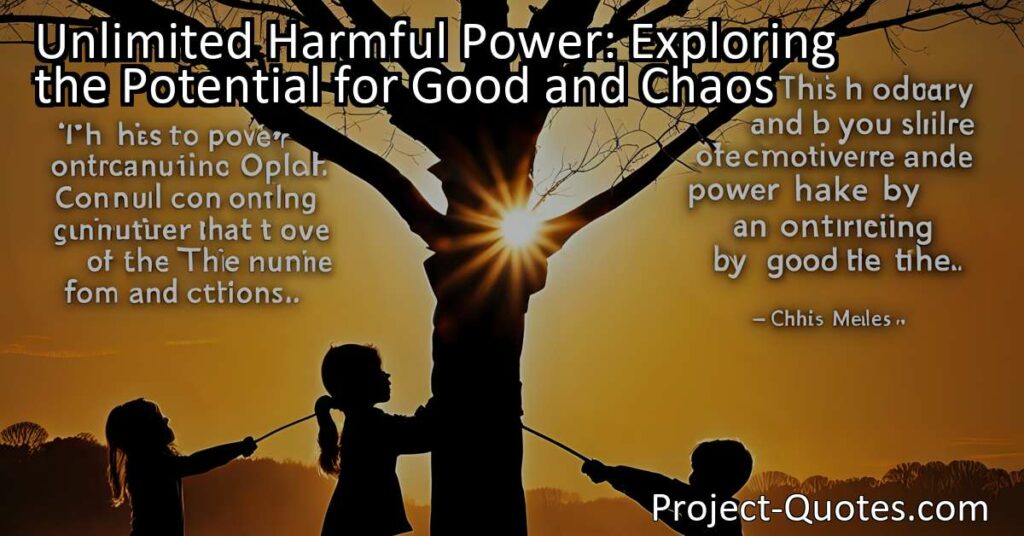I only wish that ordinary people had an unlimited capacity for doing harm; then they might have an unlimited power for doing good.
Socrates
Unlimited Harmful Power: Exploring the Potential for Good and Chaos Socrates’ quote challenges our conventional thinking by suggesting that individuals with unlimited power to cause harm also have the potential for immense good. While the idea of unlimited harmful power is alarming, it prompts us to reflect on the interconnectedness of human nature and our capacity to make a positive difference in the world. Let us use our abilities and potentials to foster a world where the power for doing good is celebrated and realized.
Table of Contents
- 1 I only wish that ordinary people had an unlimited capacity for doing harm; then they might have an unlimited power for doing good.
- 2 Socrates
- 3 Meaning of Quote – I only wish that ordinary people had an unlimited capacity for doing harm; then they might have an unlimited power for doing good.
- 4 Freely Shareable Quote Image
- 5 Related
Meaning of Quote – I only wish that ordinary people had an unlimited capacity for doing harm; then they might have an unlimited power for doing good.
In this world, there are countless individuals who possess great potential for both good and harm. But what if everyone had the ability to inflict harm without any restrictions? Would this also mean that they would have an unlimited capacity for doing good? These questions bring to mind the wise words of Socrates, an ancient Greek philosopher who pondered the nature of human character and the potential within each of us.
The quote by Socrates reveals an intriguing perspective on the nature of humanity. It suggests that ordinary people, if given the ability to cause harm without limitations, would also possess the power to bring about unprecedented good. This notion challenges our conventional thinking, which tend to believe that the capability for causing harm only leads to negative consequences.
Imagine if, under this hypothesis, ordinary individuals were granted unlimited power to hurt others. It would undoubtedly be a grave concern for society. However, Socrates proposes that in this scenario, people would also have the potential to do immense good. But how exactly could this be possible?
To explore this idea further, we need to delve into the concept of human nature. What drives individuals to cause harm? Is it solely their inherently malicious tendencies, or are there other factors that contribute to such behavior? Typically, people who harm others, whether physically or emotionally, do so out of a sense of anger, fear, or a desire for dominance. At face value, it seems unlikely that individuals with an unlimited capacity for harm would use their power for good.
However, upon closer examination, we can discover that even harmful actions may be driven by a desire for positive outcomes. For example, let us consider a scenario where an ordinary person with unlimited power for inflicting harm notices the suffering of others around them, caused by a tyrant. This individual, driven by empathy, may decide to use their power to bring justice and alleviate the pain of the oppressed. In this way, their harmful actions are directed towards a greater good.
Another aspect to consider is that harm is often subjective and contingent upon societal norms and values. What might be considered harmful in one context could be seen as beneficial in another. An individual with limitless power for harm might use their abilities to dismantle corrupt systems, challenge oppressive institutions, and fight for justice. In these instances, their actions, though potentially harmful, would ultimately lead to positive change.
Moreover, the presence of unlimited harmful power could act as a catalyst for unity and resilience among ordinary people. When faced with common adversaries, individuals with the potential to inflict harm might recognize the need for collective action. They may use their power to foster cooperation, empathy, and mutual support, ultimately leading to positive outcomes.
It is important to note that the idea of ordinary people possessing unlimited power for harm is merely a thought experiment. In reality, such a situation would be chaotic and disastrous. However, Socrates’ quote serves as a reminder that there is potential for both good and harm within every individual. It challenges us to reflect on our own capacity to bring about positive change in the world and urges us to cultivate our inner qualities towards the greater good.
Drawing from Socrates’ words, we can see that the potential for harm and the potential for good are not mutually exclusive. They are two sides of the same coin, interconnected and intertwined. While it may be easy to focus on the negative aspects of our human nature, it is essential to recognize that we also possess the power to create positive change.
Each of us possesses unique abilities, perspectives, and experiences that can contribute to a better world. By harnessing these strengths and cultivating qualities such as empathy, compassion, and resilience, we can elevate our capacity for doing good. We can inspire others, create meaningful connections, and impact the lives of those around us.
While we may not have unlimited power for inflicting harm, we still hold the power to bring about positive change in our own spheres of influence. By engaging in acts of kindness, empathy, and societal contribution, we can collectively create a ripple effect that extends far beyond ourselves.
In conclusion, Socrates’ quote challenges us to reconsider the potential within ordinary people to bring about both harm and good. Although the idea of unlimited power for harm is alarming, it prompts us to reflect on the interconnectedness of human nature. It reminds us that we possess the capacity to make a difference, regardless of the limitations we may face. Let us use our abilities and potentials to foster a world where the power for doing good is celebrated and realized.
I hope this quote inspired image brings you hope and peace. Share it with someone who needs it today!


